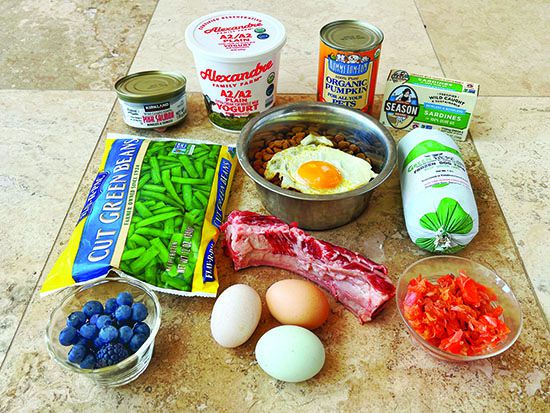Proper nutrition is essential for a dog’s overall health and well-being. A balanced diet provides the necessary nutrients to support growth, maintain energy levels, strengthen the immune system, and prevent various health issues. Understanding a dog’s dietary needs is crucial for responsible pet ownership. In this comprehensive guide, we will cover various aspects of a dog’s diet, including its nutritional requirements, feeding guidelines, common dietary choices, potential health concerns, and special dietary considerations.

- Nutritional Requirements for Dogs: Dogs require a balanced diet that includes essential nutrients such as proteins, fats, carbohydrates, vitamins, and minerals. These nutrients play vital roles in their growth and development, maintaining organ function, and supporting a healthy immune system.
- Proteins: Proteins are the building blocks of a dog’s body. High-quality protein sources like meat, fish, eggs, and plant-based proteins are essential for muscle maintenance, cell repair, and hormone production.
- Fats: Fats are a concentrated source of energy for dogs. They also play a role in maintaining healthy skin and coat, absorbing fat-soluble vitamins, and supporting the nervous system.
- Carbohydrates: Carbohydrates provide a source of energy for dogs. While they are not essential, they can be included in the diet through whole grains, vegetables, and fruits.
- Vitamins and Minerals: Vitamins and minerals are essential for various physiological functions in a dog’s body. They contribute to bone health, immune function, and enzyme activity.
- Water: Fresh, clean water must be available to dogs at all times. Water is essential for digestion, nutrient absorption, and temperature regulation.
- Feeding Guidelines:
- Feeding requirements vary based on a dog’s age, size, activity level, and health status.
- Puppies require more frequent meals and a diet formulated for growth and development.
- Adult dogs may need two meals a day, and senior dogs might benefit from more frequent, smaller meals.
- Commercial Dog Food:
- High-quality commercial dog food is a convenient and reliable option for meeting a dog’s nutritional needs.
- There are three main types of commercial dog food: dry kibble, wet/canned food, and semi-moist food.
- Home-Cooked Diets:
- Some pet owners prefer to prepare homemade meals for their dogs. If done properly, this can be a nutritious option.
- Consultation with a veterinary nutritionist is advised to ensure the diet meets all nutritional requirements.
- Raw Food Diet:
- A raw food diet consists of uncooked meat, bones, fruits, and vegetables.
- While proponents believe it provides benefits, there are potential risks such as bacterial contamination and nutrient imbalances.
- Health Considerations:
- Dogs with specific health conditions may require specialized diets. For instance, dogs with food allergies, kidney issues, or obesity.
- Veterinary guidance is crucial when managing a dog’s diet for specific health concerns.
- Toxic Foods:
- Some human foods are toxic to dogs, including chocolate, grapes, onions, garlic, and certain artificial sweeteners.
- Avoid giving dogs these harmful foods to prevent potential health emergencies.
- Portion Control:
- Overfeeding can lead to obesity, while underfeeding may result in malnutrition. Proper portion control is essential for a dog’s health.
- Treats and Snacks:
- Treats should be given in moderation and should not constitute a large portion of a dog’s daily caloric intake.
- Transitioning to a New Diet:
- Gradual transitioning between diets can help prevent gastrointestinal upset.
- Regular Veterinary Check-ups:
- Regular veterinary visits are essential to monitor a dog’s overall health, including their diet and nutritional needs.
Conclusion:
A well-balanced diet is crucial for a dog’s health and happiness. Whether choosing commercial dog food or preparing homemade meals, understanding a dog’s nutritional requirements and dietary considerations is vital for responsible pet ownership. A nutritious diet, coupled with regular exercise and veterinary care, will contribute to a long and fulfilling life for your canine companion. Always consult with a veterinarian to tailor a diet that suits your dog’s individual needs and supports their specific health requirements.